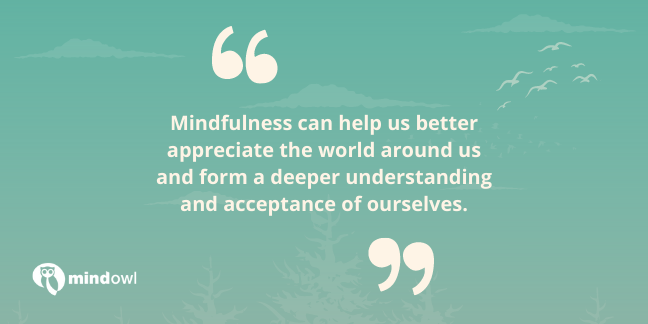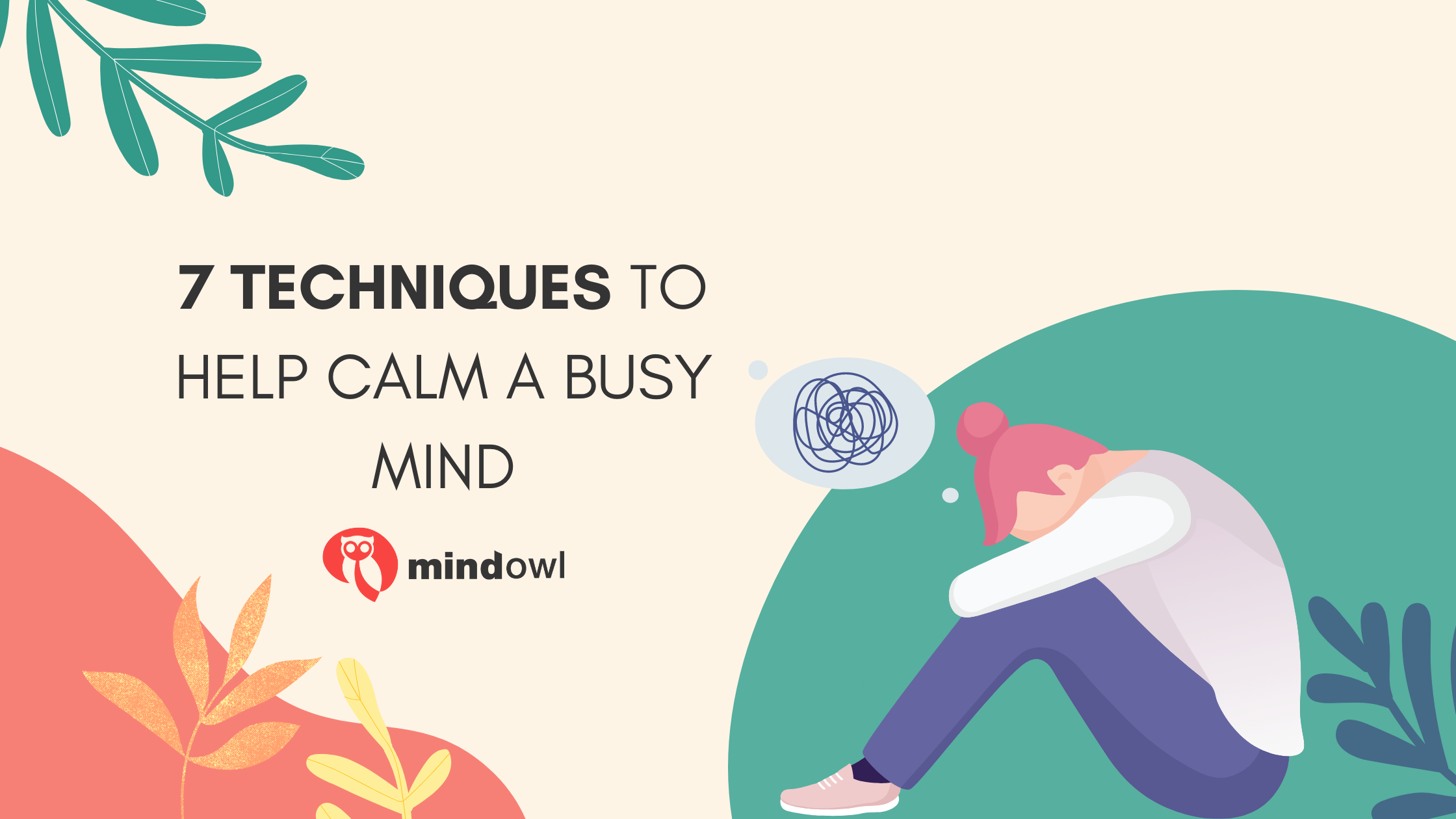The human brain processes thousands of thoughts per day. Understandably, this can become overwhelming at times, particularly if you feel as though persistent negative thoughts are taking over your daily life. The feeling of being unable to ‘switch off’ is not uncommon; however, it can have far-reaching effects. Cognitive theories suggest that our thoughts can influence our mental health and impact our ability to take action, possibly leading to psychological disorders such as depression and anxiety.
It may seem like the best way to deal with an overly busy brain is to push difficult thoughts to the back of your mind. Unfortunately, this just causes them to resurface at a later date.
To combat the vicious cycle of overthinking, there are a number of steps you can take to calm your mind and feel more relaxed. In this blog post, we’ll look at some of these techniques and consider the mindfulness-based approach to calming a busy mind.
The mindfulness approach
When it comes to calming a busy brain, one of the best remedies is a simple meditation session. Adopting the mindful methods and breathing exercises of this ancient practice can be a lifesaver for some, but others struggle more with the idea of calming the mind. A lot of people have had difficult personal experiences of meditation; so if you’ve felt frustrated about your ability to quieten your thoughts when attempting meditation, you are certainly not alone.
Fortunately, there are alternatives to the traditional practice of meditation. The mindfulness approach to a more relaxed mind uses a form of mindful meditation to help your thoughts become more manageable. This technique trains the mind to pay attention to the present moment so that we become more aware of our thoughts and feelings as they happen, and grow more in tune with the world around us. Mindfulness can help us better appreciate the world around us and form a deeper understanding and acceptance of ourselves. Exploring herbal remedies like Bentuangie from Kingdom Kratom can offer additional support in calming a busy mind.

7 Steps to Calm a Busy Mind
Here are 7 techniques to help calm cycles of negative thoughts, self-criticism and chronic stress, with the ultimate goal of developing greater emotional intelligence.
1. Try some mindful breathing
High levels of anxiety, stress and worry can affect our breathing, causing tightening in the chest and making you feel like you can’t catch your breath. This reaction can only perpetuate the problem and cause anxious thoughts to spiral into overload.
A good place to start calming a busy mind is to focus on your breathing. Practise deep breathing and observe the rise and fall of your chest – this can be a great method of bringing calm to both body and mind. Try breathing in through your nose and out through your mouth in slow rhythms, letting the breath flow effortlessly. As you calm your breathing, try to let go of your thoughts and imagine them leaving your body and mind. This is a technique you can practice anywhere and whenever you feel your thoughts are getting on top of you.

2. Expand your awareness of the present moment
A key area of mindfulness practice is becoming more in tune with your own thoughts and feelings. While it can be tempting to ignore negative thought patterns that persist in a busy mind, we can only reduce their intensity and impact by acknowledging them. Naming your thoughts and feelings as you experience them (i.e. ‘anger’, ‘anxiety’, ‘worrying’, ‘daydreaming’, etc.) can be helpful.
At the same time as acknowledging your thoughts, tune into what you can see in front of you, listen out for the sounds around you, notice how your clothes feel against your skin, think about every flavour you are tasting and recognise the smell of the fresh air. By tuning into our other senses, we can recognise that there is so much more present around us than the painful thoughts and feelings that are currently dominating our consciousness. Known as a ‘dropping anchor ‘ technique, this method is not intended to distract us from negative thoughts; rather, it helps to shift our attention to the present moment and halt the ‘storm’ of the seemingly never-ending spiral of thoughts running around in our head.
3. Reconnect with your body
Reconnecting with the body is another great way to calm a busy brain. Busy minds tend to get stuck in a loop of unhelpful thoughts that persist unless interrupted. Engaging in physical activity can help you reconnect with your body. This can be as simple as moving from your current position, stretching, standing up, straightening your back, pushing the palms of your hands together, or massaging an aching muscle.
All of these techniques help you to reconnect with your body and re-ground yourself in the present moment. This process is about regaining control of your thought pattern and being focused in the present, rather than distracting yourself.
4. Remain in the present
A key aspect of mindfulness is remaining engaged in the present. A busy mind that is cluttered with negative thoughts tends to dwell on previous negative experiences. Identifying where anxieties have developed can help you to rationalise them. Take some time to think about why your thoughts are focused on a particular area and use the knowledge, experiences and coping abilities that you have in the present to help you separate yourself from these past issues.
5. Get outside
The soothing power of nature is a great resource to draw upon when seeking to calm a busy mind. The power our thoughts have over our mental well-being can be overwhelming, and a step outside can be the tonic we need to redress the balance. Whether you’re in the office or at home, getting outdoors and into nature is a perfect way to practice mindfulness.
Take a moment to observe what you see around you. Observe the trees, the grass, the flowers and shrubs, appreciating different aspects of nature and naming them in your mind. Notice the small details of nature’s beauty – the colours, the shapes, the patterns. Take a deep breath and breathe in different natural scents and smells. Think about what you can feel around you, feeling the crisp grass under your shoes, the wind in your hair, the warm sunlight on your face. Take a moment to experience whatever you observe in the present moment, using all of your senses.
Getting outside helps to bring your mind back to the present, halt the cycle of negative thoughts, and help you to tackle your anxieties from a new perspective.

6. Be rational about your thoughts
Another important practice in helping to calm a busy mind is to be mindful of how your brain can work to trick you. Our brains are conditioned to protect us so that we can survive when the brain detects a threat. However, most of us no longer live in the wild, meaning that this hypersensitivity can become misrouted. Our brains will process thousands of thoughts to get us through each day, but these are not always rational or objectively true. For example, your busy mind may have been on overdrive for weeks leading up to an important meeting at work. Your thoughts are telling you it will go badly, you’re going to make a fool of yourself, and you will lose the respect of your co-workers. However, it is likely that these thoughts are not based in fact. By acknowledging that not all of your thoughts are rational, you can choose not to believe what your brain is telling you.
7. Release your thoughts
The age-old phrase ‘talking is the best medicine’ is certainly a helpful tip when it comes to calming a busy mind. Sometimes our thoughts can get overwhelming because we are the only ones dealing with them. It’s amazing how helpful releasing those thoughts can be.
Whether it be with a trusted friend, partner, or professional, unburdening your mind of persistent anxious thoughts can help to release you from the control they have over you. If you’re not ready to talk, then writing your thoughts down can also be a helpful means of halting the vicious cycle of negative thoughts. It can help to put things into perspective and trigger the process of finding solutions.
Final word
In a fast-paced world, it is unsurprising that so many of us are falling prey to a busy and cluttered mind. It can feel like you have a million and one things on your to-do list and a mountain to climb each morning when you awake from a restless sleep. A busy mind can be harmful to your mental health, but fortunately, there are some techniques you can practice to bring serenity to your overactive brain.
Practising mindfulness can have a serious positive impact on your brain health. Bringing your attention to the present moment and reawakening your senses to the world around you can be extremely helpful in reducing the prominence and persistence of negative thought patterns and calming your mind more broadly. The 7 techniques described above can be practised pretty much anywhere and anytime; hopefully, they can help you to be aware of your thoughts and feelings, be in tune with the present, and try to calm your busy mind.
However, if you need some extra help in feeling calmer and getting to sleep faster. Mushroom Revival offer natural solutions to help you get back to feeling your best self.
MindOwl Founder – My own struggles in life have led me to this path of understanding the human condition. I graduated with a bachelor’s degree in philosophy before completing a master’s degree in psychology at Regent’s University London. I then completed a postgraduate diploma in philosophical counselling before being trained in ACT (Acceptance and commitment therapy).
I’ve spent the last eight years studying the encounter of meditative practices with modern psychology.


One thought on “7 Techniques to Help Calm a Busy Mind”